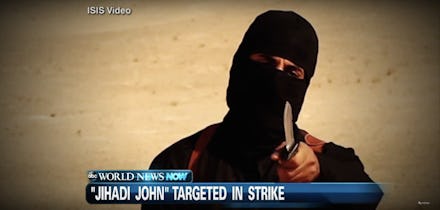'Jihadi John,' Notorious ISIS Executioner, Likely Killed in U.S. Drone Strike

On Thursday night, the United States carried out a drone strike on a vehicle in Raqqa, Syria, targeting the highly wanted Islamic State group fighter Mohammed Emwazi — known in the media as "Jihadi John" — who gained notoriety through his ominous appearances and statements made in the extremist group's beheading videos, including those of American journalists James Foley and Steven Sotloff.
An anonymous U.S. military source told the BBC there was a "high degree of certainty" that Emwazi was killed in the attack. U.K. and U.S. forces worked together on the strike. The Kuwaiti insurgent is reported to have lived in the U.K. from 1994 through 2013; it was his British accent, as heard in the beheading videos, which earned him the "Jihadi John" nickname.
The U.S. government was cautious in its response. "U.S. forces conducted an airstrike in Raqqa, Syria, on Nov. 12, 2015 targeting Emwazi, also known as 'Jihadi John,'" Pentagon Press Secretary Peter Cook announced in a statement on Thursday. "We are assessing the results of tonight's operation and will provide additional information as and where appropriate."
On Friday, the U.K.'s response was equally non-committal. "If this strike was successful, and we still await confirmation of that, it will be a strike at the heart of [the Islamic State group]," British Prime Minister David Cameron said from 10 Downing Street, according to the Washington Post.
"Emwazi, a British citizen, participated in the videos showing the murders of U.S. journalists Steven Sotloff and James Foley, U.S. aid worker Abdul-Rahman Kassig, British aid workers David Haines and Alan Henning, Japanese journalist Kenji Goto, and a number of other hostages," Cook explained. The miscellany of murders made the Briton a highly sought-after target.
Emwazi was born in Kuwait in 1998 to a stateless Iraqi family, before moving to the U.K. in 1994, where he became a computer programmer, according to the BBC. He is believed to have moved to Syria in 2013, and became a wanted man after his appearance in the Aug. 2014 video of Foley's execution.
Diane Foley, the mother of slain journalist James Foley, told ABC that confirmation of Emwazi's death would be "a small solace to us."
"This huge effort to go after this deranged man filled with hate when they can't make half that effort to save the hostages while these young Americans were still alive..." she said.
Conversely, Cameron described pursuing Emwazi as "self-defense," Al Jazeera reports. "It was the right thing to do ... Britain and our allies will not rest until we have defeated this evil terrorist death cult."